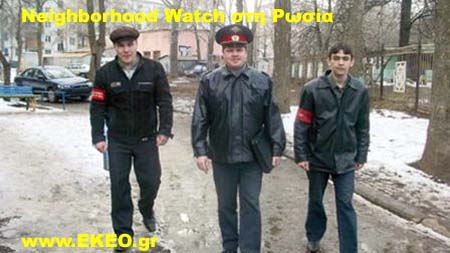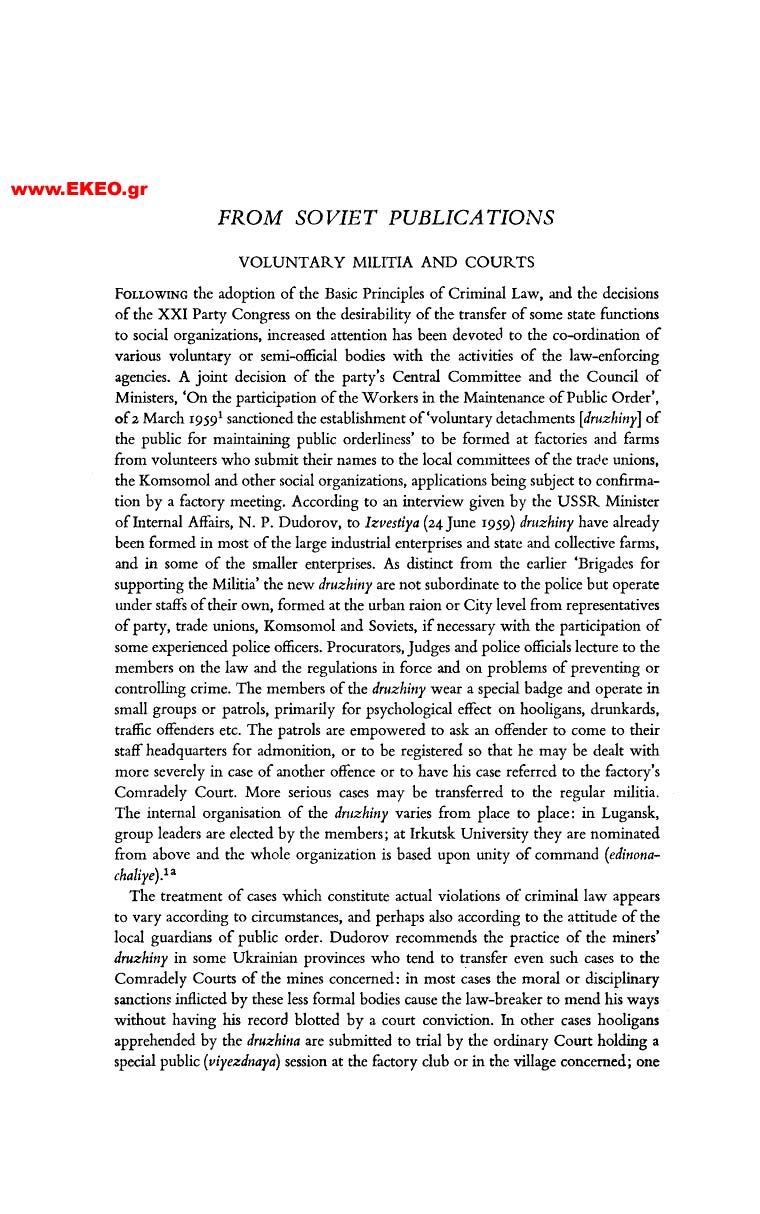Druzhina: Πρόγραμμα Neighborhood Watch της ΕΣΣΔ συνεχίζεται σήμερα με σύγχρονο τρόπο στη Ρωσία
Δημοσιευμένο από EKĖO στην κατηγορία ΣΩΜΑΤΑ ΑΣΦΑΛΕΙΑΣ, Ετικέτες: Druzhina, Hellenic Neighborhood Watch, Ελληνική Πολιτοφυλακή, ρωσία Αν και το EKEO διέκοψε την ίδρυση του προγράμματος Hellenic Neighborhood Watch στην Ελλάδα λόγω της ανώριμης, δημαγωγικής και ύποπτης επίθεσης που δέχθηκε όσο περνάει ο καιρός αντιλαμβάνονται όλοι ότι πολλές Ευρωπαϊκές χώρες έχουν αντίστοιχα προγράμματα. Ιδιαίτερα το πρόγραμμα αυτό υπάρχει σήμερα στην Ρωσία και προέρχεται από το κομμουνιστικό πρόγραμμα druzhina, φυσικά είναι σήμερα πολύ πιο μοντέρνο, δημοκρατικό και εξελιγμένο. Τρία εκατομμύρια δολάρια έδωσε το 2004 ο Δήμος Μόσχας προκειμένου να δημιουργηθούν 676 ομάδες πολιτών δημόσιας ασφάλειας πολιτών σε διάφορες περιοχές της Μόσχας. Τα μέλη της druzhina αποτελούν πηγή ασφάλειας στις γειτονιές και βοηθούν σε διάφορα άλλα κοινωνικά θέματα. Όσοι στην Ελλάδα θορυβήθηκαν από την πρόταση του EKEO περί ίδρυσης Hellenic Neighborhood Watch στην Ελλάδα θεωρώντας ότι πρόκειται για Αμερικανικής έμπνευσης πρόγραμμα ας διαβάσουν τι λέει το Wikipedia για το αντίστοιχο πρόγραμμα της ΕΣΣΔ και θα διαπιστώσουν ότι ήταν πρώτοι οι Κομμουνιστές που το ίδρυσαν και στη συνέχεια προέκυψε στις ΗΠΑ. Διαβάστε επίσης ακόμη μια πολύ θετική και ενημερωτική ανάλυση για το Neighborhood Watch της Ρωσίας εδώ, την οποία παραθέτουμε στα Αγγλικά στο τέλος της ανάρτησης. Διαβάστε επίσης εδώ (στα Ρωσικά) τις δραστηριότητες ίδρυσης (Neighborhood Watch – Πολιτοφυλακής) της σημερινής Ρωσικής Κυβέρνησης
Αν και το EKEO διέκοψε την ίδρυση του προγράμματος Hellenic Neighborhood Watch στην Ελλάδα λόγω της ανώριμης, δημαγωγικής και ύποπτης επίθεσης που δέχθηκε όσο περνάει ο καιρός αντιλαμβάνονται όλοι ότι πολλές Ευρωπαϊκές χώρες έχουν αντίστοιχα προγράμματα. Ιδιαίτερα το πρόγραμμα αυτό υπάρχει σήμερα στην Ρωσία και προέρχεται από το κομμουνιστικό πρόγραμμα druzhina, φυσικά είναι σήμερα πολύ πιο μοντέρνο, δημοκρατικό και εξελιγμένο. Τρία εκατομμύρια δολάρια έδωσε το 2004 ο Δήμος Μόσχας προκειμένου να δημιουργηθούν 676 ομάδες πολιτών δημόσιας ασφάλειας πολιτών σε διάφορες περιοχές της Μόσχας. Τα μέλη της druzhina αποτελούν πηγή ασφάλειας στις γειτονιές και βοηθούν σε διάφορα άλλα κοινωνικά θέματα. Όσοι στην Ελλάδα θορυβήθηκαν από την πρόταση του EKEO περί ίδρυσης Hellenic Neighborhood Watch στην Ελλάδα θεωρώντας ότι πρόκειται για Αμερικανικής έμπνευσης πρόγραμμα ας διαβάσουν τι λέει το Wikipedia για το αντίστοιχο πρόγραμμα της ΕΣΣΔ και θα διαπιστώσουν ότι ήταν πρώτοι οι Κομμουνιστές που το ίδρυσαν και στη συνέχεια προέκυψε στις ΗΠΑ. Διαβάστε επίσης ακόμη μια πολύ θετική και ενημερωτική ανάλυση για το Neighborhood Watch της Ρωσίας εδώ, την οποία παραθέτουμε στα Αγγλικά στο τέλος της ανάρτησης. Διαβάστε επίσης εδώ (στα Ρωσικά) τις δραστηριότητες ίδρυσης (Neighborhood Watch – Πολιτοφυλακής) της σημερινής Ρωσικής Κυβέρνησης
Στην εικόνα βλέπουμε τον επικεφαλής μιας ομάδας Druzhina (Πρόγραμμα Neighborhood Watch της Ρωσίας) με μέλη της ομάδας του. Ασφαλώς το πρόγραμμα τους δεν είναι τόσο σύγχρονο όσο αυτό που θέλαμε να ιδρύσουμε και αφορούσε το αντίστοιχο των ΗΠΑ αλλά όλα αποδεικνύουν ότι η πρόταση του EKEO αντιμετωπίσθηκε από ορισμένους άκριτα, παρορμητικά και δημαγωγικά.
Όσοι έσπευσαν να δυσφημίσουν το Ελληνικό Κέντρο Ελέγχου Όπλων για την κοινωφελή αυτή προσπάθεια έχουν ακόμη χρόνο να επανορθώσουν αν και δεν έχουμε πλέον καμία πρόθεση να συνεχίσουμε και να δεχόμαστε απειλές και επιθέσεις από κουκουλοφόρους και τους Αρχηγούς τους. Όπως μας είπαν οι αρμόδιες Αρχές η επιστημονική μας πρόταση είναι πολύ καλή αλλά είναι πολλά χρόνια μπροστά για την Ελλάδα και δεν μπορεί να εφαρμοσθεί.
Ακολουθεί μια Αγγλική ανάλυση του Neighborhood Watch της Ρωσίας:
MOSCOW (RIA Novosti political commentator Vladimir Simonov)
Visitors to London often see funny pictures dotted around residential areas depicting a group of meerkat standing on their hind legs on sentry duty. These are Neighborhood Watch signs informing people that local residents are keeping an eye on their neighborhood so that no one disturbs public order or, God forbid, indulges in some form of criminal activity.
Similar signs might soon appear in Moscow and other Russian cities. The final amendments to the Law on Public Vigilance Centers in Moscow were recently adopted. The Moscow Duma deputies had already adopted the Law on the Participation of Local Residents in Maintaining Public Order and the Law on Voluntary People’s Patrols in Moscow.
This raft of documents reflects the serious concerns the city authorities started having five years ago in the wake of attacks perpetrated by Chechen terrorists on Guryanova Street and Kashirskoye Highway. However, it took the hostage taking on Dubrovka and the recent bombing at Rizhskaya metro station to finally convince the city authorities that the police and security services alone could not ensure the appropriate level of security for Muscovites. The capital needs constant voluntary help from local residents and the scheme could be adopted in other cities.
Russian human rights activists started to criticize the initiatives immediately. “We’re back to telling on our neighbors and friends again, like we did under Stalin. Have you forgotten how many hundreds of thousands of innocent people were shot after false reports provided by such voluntary stool pigeons!” Opponents of the measures recall the times when, fearing the KGB, Russians had to discuss serious issues in the kitchen with the radio on.
However, the chairman of the Moscow City Duma’s security committee, Inna Svyatenko, has a different opinion. “The times and laws have changed,” she says. “Voluntarily patrols will not interfere intheir neighbors’ personal lives, as they will only report suspicious residents and tenants to the police. It is foolish to speak about a return to the old repressive system.”
It should be noted that under Stalin there were no laws, official or unofficial, regulating the wave of reports on political unreliability. Neighbors reported on neighbors, and brothers on brothers because of the total fear that gripped the country in the mass repressions.
A system of voluntary public vigilance was introduced in 1953, the year Stalin died. At that time, due to an amnesty declared by Nikita Khrushchev many criminals were set free and a wave of murders literally swept the country. The authorities only managed to halt it with the help of voluntary patrols who wore red armbands when they patrolled the streets day and night. The city authorities allocated special facilities for the headquarters, some of which have survived, albeit in a state of total neglect and dilapidation. Moscow alone has about 600 of them, but in the past local police officers used some of them for their own purposes. Often, they would drink vodka with friends there or would rent them out to local entrepreneurs as warehouses.
Today, these facilities have been reborn. They accommodate public vigilance headquarters (PVH), which receive reports about suspicious people and accidents, decide what to do with local hooligans and provide voluntary patrol members with a place to take a rest.
These facilities have a public-state status. The authorities not only provide the buildings, but also pay for communal services. The city budget also covers the salaries of chairs of the local vigilance councils. The wages are rather low, $100-$150 at the most, but many retired volunteers like the chance to earn a little extra money. In the future, the authorities plan to raise their salaries. Moscow Mayor Yuri Luzhkov recently promised to allocate $3 million for these purposes in 2005. The more money the authorities pay, the higher the level of public enthusiasm becomes. Today Moscow has 686 PHVs with about 10,000 people working for them. An additional 19 PHVs will be set up in new residential areas in the capital. Without waiting for a federal law, the local authorities in other Russian cities are starting to implement this initiative, as well. Voluntary patrols can be seen on the streets of Orel, Voronezh and other “criminally unstable” Russian cities.
At present, volunteers normally work for free, which is why few young people are willing to join their ranks. The majority of volunteers are pensioners, and retired military or law enforcement officers. Skeptics, as usual, express their doubts. Can people with rheumatism, back conditions, and other age-related ailments stop or detain young and muscular criminals?
“Sure they will,” believes Sergei Shchadrin, Russia’s deputy interior minister and head of the Public Security Service. When answering local residents’ questions over a telephone hotline established by a popular newspaper, he promised to supply volunteers with special equipment: batons, handcuffs, mace cans, etc. “And, of course, there always be an armed police officer nearby,” Mr. Shchadrin emphasized.
Nevertheless, even without special equipment, the Russia’s volunteers are dealing with hooligans rather successfully. Recently, parents in the Shchukino district of Moscow noticed a group of suspicious looking individuals prowling around the local school. They reported the suspicious activity to Albina Tsareva, the head of the nearby PHV. “We checked these people out and discovered that they were drug dealers,” she says. “When the police questioned them, the dealers told them the location of two drug-dealing centers and the police closed them down.”
There are other problems that volunteers in Ms. Tsareva’s patrol face. For example, after the completion of the construction of elite residential complex Alye Parusa, the district was literally terrorized by illegal immigrants from CIS countries. “Young women were afraid to leave their houses at night,” Mrs. Tsareva recalls. “We found out quickly where all these Tajiks and Uzbeks lived and reported them to our local police officer who organized their eviction.”
Today, the shadow of Stalin with his informers does not haunt the dreams of even the most vindictive human rights activists. They agree that volunteer patrols are making life in Russia’s cities safer with every day.
Διαβάστε εδώ ανάλυση της Druzhina όπως ιδρύθηκε πριν από μισό αιώνα (φυσικά εδώ αναλύεται ένα πρωτόγονο σύστημα αλλά όμως αποτελεί ένα διαφωτιστικό κείμενο για ιστορία του Neighborhood Watch στην πάλαι ποτέ ΕΣΣΔ και προέρχεται από το επιστημονικό περιοδικό Soviet Studies Vol. 11, No. 2 (Oct., 1959), pp. 214-217.)

 Άρθρα (RSS)
Άρθρα (RSS)